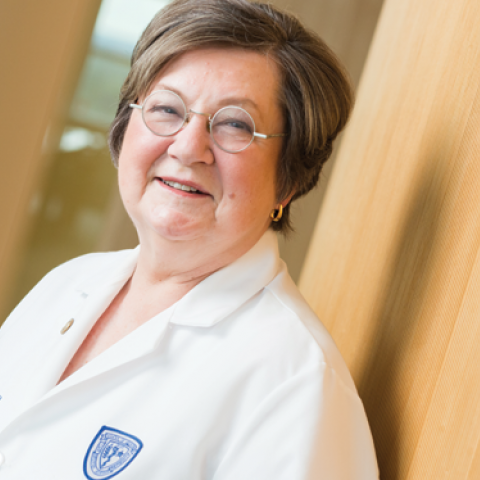And so, we entered commencement weekend. The opening event was the awards ceremony, then the special CCLCM ceremony, then the convocation, and finally our diploma ceremony. IT seemed quite immediate on the computer screen. Our speaker, Bruce Walker, told his own story of things being unexpected in his career—yet highly successful. Tom Mihaljevic showed the transformation of the HEC to Hope Hospital in time-lapse. I got a chance to say farewell to the Class of 2020 in my last commencement. And then, it was over. Our students were graduated.
There were more than usual this year—driven by some students who took extra years of research, a bumper crop of 17 MD-PhD graduates, additional CCLCM students, and a full complement of four MD-DMD students. Two hundred thirty-five in all, of whom 220 elected to participate online. Now, they are off to great residencies around the country—minus the robes, minus the hugs—but no less honored and loved. Most of them are eager to serve in this time of need. Our graduate students must feel a greater urgency than ever for discovery. What we don’t know about the coronavirus CAN hurt us. The next scourge may be another infection or the “regular” killers of cancer, heart disease, stroke, neurodegeneration. We must get on it and find ways to combat the diseases that plague humanity.
Much has been written about what is lost in the social distancing rules, but for these students, we need to concentrate on what is gained. This has forced us to focus on what is really important—why we award the MD, or the PhD, or the masters degrees. What is the essence of what we teach? Sure, we can measure mastery of content, but for physicians, it is equally important to display professionalism. It is important that we model empathy—but not to the extent that we are unable to act to heal.
As we graduate students to be scientists, it is important that they internalize the responsible conduct of research—not shaving the data to fit a cherished hypothesis, dealing honestly with our granting agencies, publishing with integrity, giving credit where it is due. The intangibles matter, and it is my profound hope that we have modeled these characteristics and our students have internalized them.
As we launch these students, we prepare for the next class—as early as next week for our physician assistant and masters of science in anesthesia programs. And early in July, we welcome a new crop of medical students. There has been much talk about how universities will handle their classes in the face of the COVID uncertainties. For health care, we cannot delay a year or even a semester in turning out the very highest quality new health professionals. It is a crisis out there, in health care and in research. We must persevere and deliver the best education in the safest way possible.
We cannot delay in producing public health professionals, either. They, and their statistician colleagues, have come front and center in the fight against viral spread. Lab researchers are under great pressure for a drug, a vaccine, a control measure to stop the devastation of the virus. It may be a graduate student who has the flash of insight that breaks open the case. So, we do not have the luxury of delay—we have to find tactics to educate when physical separation of teachers and learners is required.
The faculty has risen to the challenge. We still have a little time to plan for how to teach teamwork and leadership remotely, but we are now returning our students to clinical rotations in close collaboration with our hospital affiliates, and we are planning to greet our first-year students both in-person and remotely. World circumstances demand that we press on.
So, to the 2020 grads—hail and farewell! To the students arriving as soon as next week—welcome, and join the team. It’ll be a fascinating ride!
Pam


